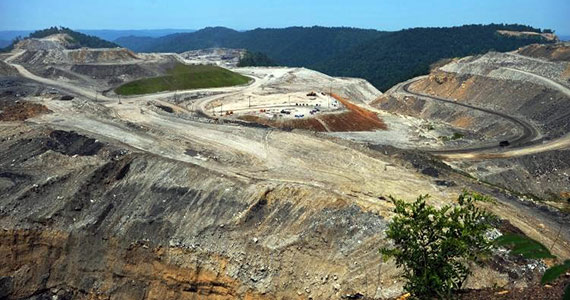
Mountaintop removal practices were used on this mountain in West Virginia. The mountain had been covered with trees like those hills in the background.
Appalachia is a region deeply connected to the history of the United States, yet rarely makes the headlines.
Jeff Bary, assistant professor of physics and astronomy, aims to change that by introducing a multidisciplinary series to Colgate honoring Appalachian culture and, more importantly, bringing awareness to what he considers a social and environmental crisis known as mountaintop removal.
“As a result of devaluing the people that live in this region of our country, we’ve justified the exploitation of this region,” said Bary. “The coal industry comes in and strips all the trees off the top of the mountain and blasts off the top with a lot of dynamite.”
Bary said that in addition to devastating the landscape, mountaintop removal releases heavy metals that pollute the air and water supplies of the region.
A West Virginia native, Bary saw that his hometown was identified in Chris Hedges’s ’77 book Days of Destruction, Days of Revolt as a “sacrifice-zone,” a place where the local environment and population are exploited in the name of corporate profit.
Bary invited Hedges to campus last fall to give a public lecture. During a dinner with a dozen other faculty members, the seed for the Moving Mountains in Appalachia series was planted. He found support from the Colgate Arts Council and from colleagues such as Lynn Schwarzer, professor of art and art history and a member of the council.
“It is the scope of his [Bary’s] vision that makes this project so special,” said Schwarzer.
Bary hopes to reflect the multi-disciplinary responses that have come out of this crisis.
“When there is a threat to a people and a culture, that culture responds in many different ways. You see this in social movements all the time. Music, for example, is always associated with activism. You see this with Appalachia, as well,” he said.
Musicians, environmental activists, authors, graphic artists, filmmakers, and scientific experts will all participate in the series, which begins Friday, September 20, and runs until mid-November.
“I hope that I not only reach the students here but somehow get the local community involved. There are important lessons to be learned from what’s happened in Appalachia,” he said.
To see a full calendar of events, click here.